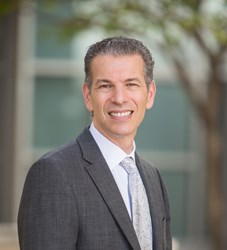
“Recipients of the 1st Annual Endeavor Awards will include the true heroes of flying, both individuals and organizations, who have demonstrated their commitment to Public Benefit Flying,” said Mark Wolper, a producer at Warner Bros., CEO of The Wolper Organization, and Chair of the Endeavor Awards Gala Host Committee.
“Recognizing that positive healthcare outcomes are enhanced by timely transportation to care, we are delighted to welcome the CEO of UCLA Hospital System, David Feinberg, MD, MBA, to our Host Committee,” said Wolper.
“On behalf of UCLA Health System, I am honored to accept this important voluntary role,” said Dr. Feinberg, president of the UCLA Health System, CEO of the UCLA Hospital System and associate vice chancellor of UCLA Health Sciences [see Photo]. “UCLA’s hospitals are the No.1 Southern California destination for inbound Angel Flight West patients. Because so many of our patients and families benefit from these important transportation services, this gives me – and UCLA Health System – an excellent opportunity to join in honoring Public Benefit Aviation.”
Because so many of our patients and families benefit from these important transportation services, this gives me – and UCLA Health System – an excellent opportunity to join in honoring Public Benefit Aviation.
Other Endeavor Awards Host Committee members include Robert Zemeckis, Oscar-winning director; Scott Parazynski, Endeavour Astronaut; Clay Lacy, legendary aviator; and Dr. Peter Diamandis, the Chairman and CEO of XPRIZE.
Wolper said that proceeds of the May 4, 2014 event at the Samuel Oschin Space Shuttle Endeavour Pavilion in the California Science Center, will benefit Angel Flight West (AFW), whose corps of volunteer pilots gives the gift of flight to thousands of children and adults who require treatment at faraway medical centers.
About The Endeavor Awards:
The Endeavor Awards is an annual event honoring the pilots, individuals and support organizations, corporations and government agencies most responsible for providing Public Benefit Aviation. The inaugural Endeavor Awards event will be held on May 4, 2014 at the Samuel Oschin Space Shuttle Endeavour Pavilion in the California Science Center.
About Public Benefit Aviation:
Using their own time and general aviation aircraft, pilot volunteers from the many Public Benefit Aviation organizations help hundreds of people each month, providing health, compassion, and community service.
About Angel Flight West:
Angel Flight West (AFW) (http://www.angelflightwest.org) is a 30-year-old organization of volunteer private pilots offering the gift of flight to thousands of stricken children and adults. Along with its commercial airline partners, AFW provides non-emergency air transportation without cost to qualified passengers. Missions flown by AFW include private pilots volunteering their time and donating all expenses to provide access to treatment at faraway medical centers; transporting blood to critically ill patients; flying special needs kids to summer camps; and many more humanitarian missions.
About Timely Transportation to Healthcare:
Academic studies at leading medical centers stress the importance of adequate, affordable and timely transportation in generating positive healthcare outcomes:
1. The University of Illinois at Chicago reports that lack of transportation is an important barrier to healthcare access for those with lower incomes or the under/uninsured.
2. Wayne State University cited lack of transportation as a causal factor in the low levels of retention of minority women in cancer screening, prevention, and treatment trials.
3. At the Washington University School of Medicine, problems with transportation and distance from the medical center were reasons given.
4. Indiana University School of Medicine determined that barriers to pain self-management included limited resources (e.g., transportation, financial).
5. The University of California, San Diego said that ten percent of Latinas mentioned system-level barriers (e.g., lack of transportation or language-appropriate services) as reasons not to participate in clinical trials for HIV-positive Latinas.
